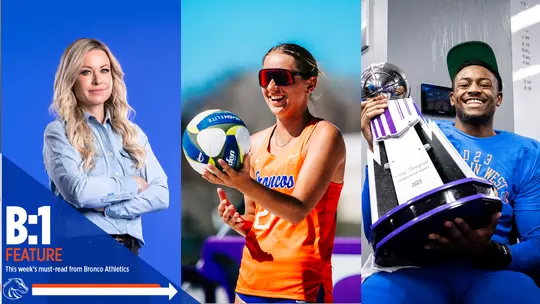
Mental Health Matters: The Impact of BroncoBOLD
David Dietrich
To some, the life of a college athlete may seem ideal. Student-athletes can continue playing the sport they love while receiving a scholarship that helps them pursue their degree. Meals, apparel, travel and heightened social status are some of the many benefits of playing a college sport. Student-athletes are also allowed to earn money from name, image and likeness deals.
However, the challenging side of being a student-athlete is often forgotten or left out of the discussion. Facing pressure to win, balancing athletics and academics, missing time to socialize, being hundreds of miles from home, and overcoming injury setbacks are some of the various factors that take a toll on a student-athlete’s mental health. Boise State has a specific initiative to ensure these athletes have the resources to take care of their mental health as much as their physical health.
In 2019, BroncoBOLD was founded by Stephanie Donaldson and a committee of Boise State student-athletes. Donaldson, the assistant athletic director of athletic counseling and performance psychology, and the student-athletes, who represented various teams, were passionate about mental health advocacy. Together, the group championed a message of hope, help and resiliency to the entire community by utilizing the platform of sport.
The initiative has grown immensely in five years, integrating the program into the athletic department, campus and community. The mission of BroncoBOLD is built on three pillars: Raise Awareness, Reduce Stigma, Cultivate Resilience. Donaldson, Lily Patock (beach volleyball) and Markel Reed (football) have made significant contributions to the mission of BroncoBOLD.

Raise Awareness: focus on education and proactive prevention by utilizing multiple platforms, including social media, workshops, sponsored events and athletic competitions.
Stephanie Donaldson was a four-year member of the Pepperdine swim and dive team, serving as team captain her senior year. During her time, she experienced challenges with her mental health and had very few options for help. “I felt very alone in my struggle,” she said. “No one was talking about mental health in the early 2000s.”
Donaldson spent the next decade obtaining experience and certifications, becoming a licensed clinical professional counselor, national certified counselor and certified eating disorder specialist. She interned at Boise State University and worked various counseling centers in the Treasure Valley before starting a role with the athletic department in 2018. She was the Broncos’ first director of athletic performance to focus on the mental health of student-athletes. She has since been promoted, currently holding the title of Assistant Athletic Director, Athletic Performance Psychology. In 2022, Boise State expanded to two full-time clinicians, hiring EJ Leitzinger as Assistant Director for Athletic Performance Psychology.
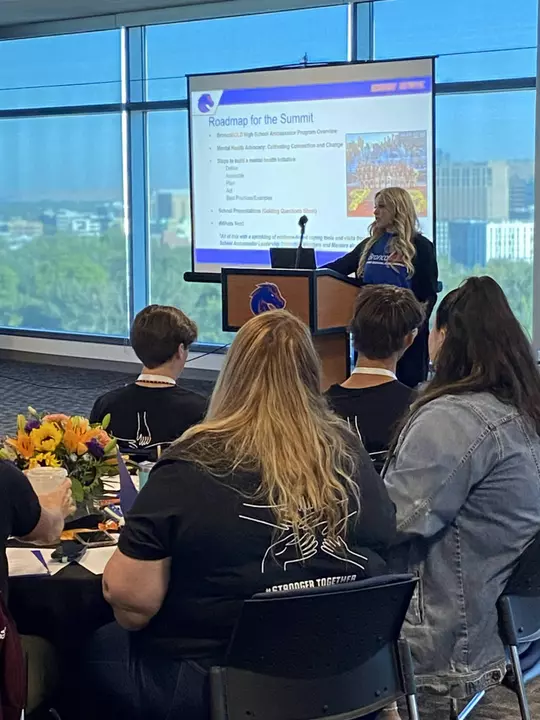
Donaldson’s experience as a student-athlete and counselor gave her insight into the struggles student-athletes face.
“In general, student-athletes experience similar stressors as their same-aged peers who aren’t student-athletes. However, as a student-athlete, there are additional pressures and responsibilities to navigate that can seem overwhelming,” she said. “Collegiate student-athletes are juggling a lot and things like anxiety or depression may show up differently for the athlete population. We’ll often hear words like overwhelm, fatigue and lack of motivation used to describe their inner experience because sometimes it feels less stigmatized to come in for a sports performance concern.”
By 2019, Donaldson saw enough similarities between herself and current student-athletes that she knew a change was needed.
“I started to recognize some of the same themes as when I was in college. There seems to be this internalized badge of disillusioned strength one can gain by not talking about mental health,” Donaldson said. “I found it disheartening that almost two decades later, student-athletes were still feeling alone and as if teammates couldn’t relate. I knew if change was going to happen, it would need to be led by student-athletes.”
Donaldson brainstormed with women’s soccer player Kennedi Paul and the duo found five other student-athletes to form a leadership committee for BroncoBOLD. While the early days weren’t always smooth, the group never wavered from their goal of raising mental health awareness.
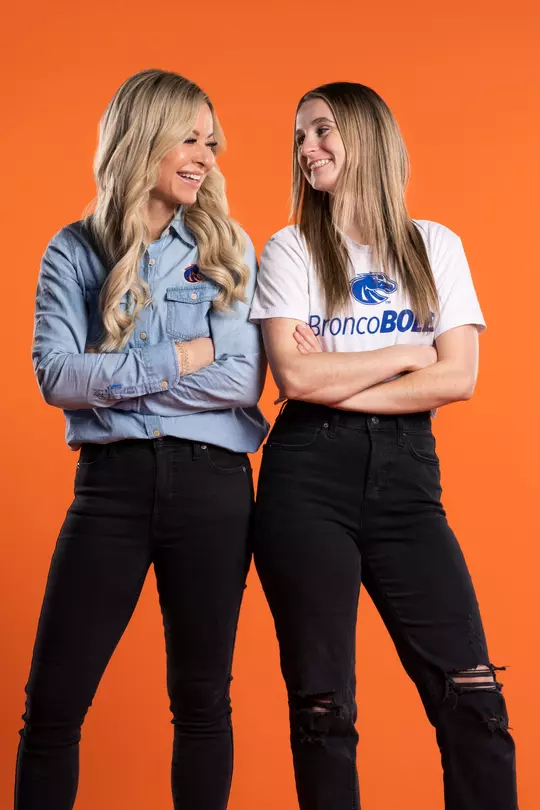
“There wasn’t an established model to follow and it felt like we were building it as we went through trial and error. No matter what, this group was always focused on the ability of student-athletes to use the platform of sport to normalize conversations in the mental health space,” said Donaldson. “The inaugural group was motivated to spread their message outside of the athletic department, to the campus and greater community and there was such power in that type of organic growth when it came from such authentic intentions.”
Six months later, the impact of COVID-19 created an increased discussion about mental health, giving the BroncoBOLD committee an opportunity to raise awareness.
“The trick with any of these sorts of initiates or start-up campaigns is to be able to keep the conversation moving and relevant,” said Donaldson. “Student-athletes sharing their lived experience was authentic and real. Anyone, athlete or not, could find themselves in those stories. We were moving the needle and opening the door.”
Today, BroncoBOLD has reached the entire Boise community, something Donaldson credits to the student-athletes.
“I feel like the power of BroncoBOLD really comes from the student-athletes’ willingness to be authentic and vulnerable and to use their platform of Boise State Athletics to share a message of hope and healing to the entire community,” she said.
However, the work is far from done.
“The conversations have been started, and we need to not only continue those conversations, but to also respond. Action creates change and conversations alone aren’t enough. Awareness alone is not enough,” said Donaldson. “BroncoBOLD ties in the importance of education, awareness and a strengths based approach to summon our campus and our community in a call for action.”
An example of BroncoBOLD’s impact in the community was Chalk the Walk, an event held at the beginning of September. Student-athletes, staff and other community members had the opportunity to spread positivity with messages on sidewalks.
“This was an event that started very small, just in athletics in 2019, and steadily expanded to encompass a whole community in 2024” Donaldson explained. “This year, we had hundreds of people chalking in the Treasure Valley, at local businesses, on Boise State’s campus and at over 40 elementary, junior high and high schools, all spreading awareness and messages of hope and connection.”
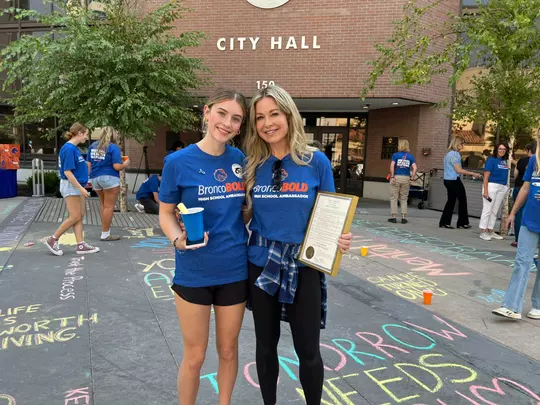
What began as a seven-person committee has become an initiative that spreads awareness to the entire Boise State athletic department and Treasure Valley community. The impact has been felt by countless people and Donaldson knows the immense good it will continue to do.
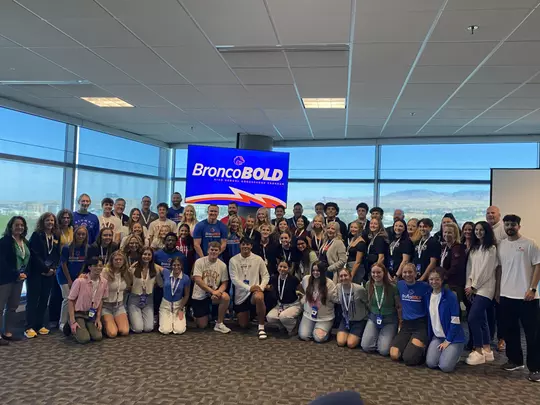
“Through BroncoBOLD’s high school ambassador program, we are established in 10 high schools, helping these students become agents of change by starting initiatives in their schools and becoming advocates in their own spaces, which has a profound ripple effect into the junior highs and elementary schools,” she said. “Through creating awareness and by offering educational opportunities that specifically teach local teachers, coaches and administrators how to recognize when someone is struggling and what to do, we create an action step that can save lives.”
Reduce Stigma: empower individuals to embrace a culture of help-seeking and inclusion through personal stories and messages of strength.
Lily Patock came to Boise State after a successful volleyball career in her hometown of Sacramento, Calif. She played on the indoor team at Christian Brothers High School, leading the program to four conference titles and earning league MVP as a senior. She also competed for the Moxie Volleyball Club of Sacramento, a beach volleyball team that received a bid to the 2021 AAU Junior Olympic Tournament.
Eager to begin her career with the Broncos, Patock soon realized the stark difference between high school and college athletes. She made her Boise State debut in the Gold Division bracket at the Alki Pairs Tournament, facing a pair that included Natalie Robinson, an All-American and Washington’s all-time wins leader.
“I vividly remember my first college match. We were in Washington and I was playing one of the girls on the UW ones team. She was an absolutely phenomenal athlete,” said Patock. “There’s always a point in an athlete’s career where you’re like ‘Wow, this is the next level.’ Juniors are a whole different ballpark.”
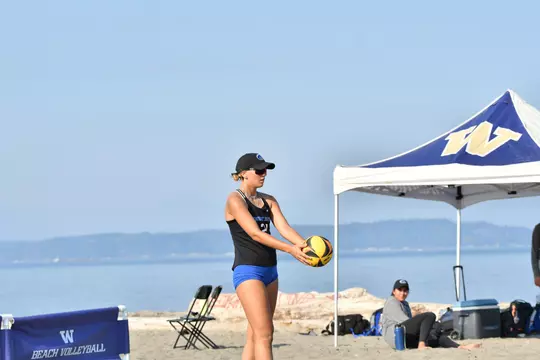
Facing new challenges also presented new opportunities for Patock, such as involvement with BroncoBOLD.
“While I was getting recruited, I just wanted to be playing in college. Now that I’m here, I’ve learned about what it takes to be a student-athlete,” she said. “There’s all the pressure and drive to win. Most athletes are super driven internally. I think having that support around you is a huge step to being a holistic athlete.”
Patock was involved in various BroncoBOLD events during her first two years at Boise State, which she credited to Donaldson.
“Stephanie has been awesome. She’s everywhere at once. We do a lot of mental health talks, showing students ways they can improve their mental game and having speakers come in.”
The involvement did not go unnoticed, as other student-athletes recommended Patock join the BroncoBOLD leadership committee.
“I already do a lot of volunteer work, so I know most of the people that are involved,” said Patock, who proudly represents her program. “Volunteering and helping our community are a really big part of being on the beach volleyball team.”
Donaldson officially asked Patock to join the BroncoBOLD leadership committee before the 2024-25 school year. The student-athlete group includes Patock, Reed, Ahmed Hassanein (football), Abby Muse (women’s basketball), O’Mar Stanley (men’s basketball) and Brook Thompson (softball). The group works to further the initiative of BroncoBOLD. Patock is a public health major, so reducing stigma is extremely important to her.
“Mental health is becoming a huge part of having holistic health and wellness, especially in the state of Idaho. There have been a lot of recent tragedies and suicides, especially in young people,” she said. “I think there is a stigma that contributes to the idea most people have about mental health. We’re trying to break that up and bring mental health back into the talks about health and wellness. It’s not necessarily just physical, it’s all of your health.”
Much like her athletic career, Patock sees challenges and opportunities in starting conversations about mental health.
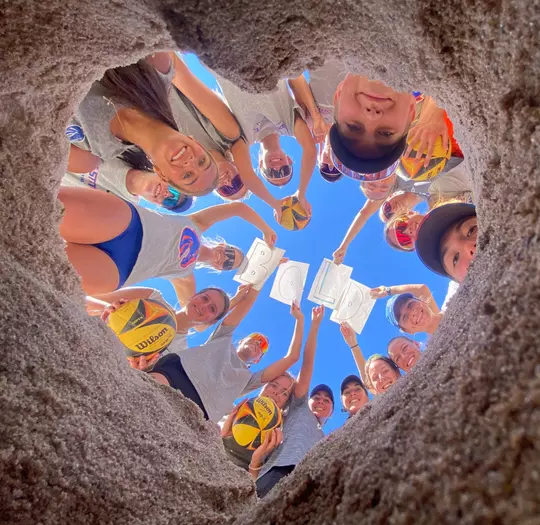
“I think a lot of people that I’ve worked with have been wanting to get involved. The issue is that it always takes a tragedy or a hardship to cause people to think about their mental health or others’ mental health,” she said. “That’s the sad part. That’s what we’re trying to stop. Once people’s eyes are opened to that aspect, they’re willing to make a change, add a new program or do anything small to make that improvement.”
A selfless teammate, Patock wants to use her platform to help others, specifically younger athletes.”My brother’s an athlete in high school right now. I want to build a community, whether that’s in Boise or outside of here, that shows everyone that health includes our mental health, and mental health can really affect all of our lives,” she explained. “I want to build that into our routines, checking in and making sure, ‘Am I okay today?’ I think it’s a huge way to keep growing ourselves. I want to show my brother that it’s possible in this world.”
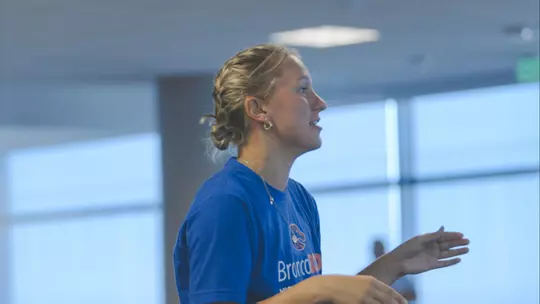
Patock’s message to her brother and other young athletes is the same one she lives by: one thing at a time.
“As an athlete, you have so much on your plate. It’s hard to juggle sometimes,” she said. “Breaking it down and breathing through the tough parts is what really helps you maintain your equilibrium when it gets tough. Go one step forward at a time, whether it’s small or big. You might take a couple steps back and that’s okay. Moving forward is the best option.”
Patock is one of 20 beach volleyball student-athletes at Boise State. The team begins competition in early October and continues until late April, with a brief break in the winter. The small roster and long season provide countless chances for the team to grow closer, which is evident to Patock through the group’s participation in BroncoBOLD.
“Building BroncoBOLD into our everyday life, our everyday athletics and everyday student part of being a student-athlete has really improved our overall well-being,” she said.“Having the Athletic Counseling Center for us to be able to utilize has really helped everyone, whether it’s in-game, out of game, having some kind of issue to work through improving your balance overall. I think our team has really taken that and run.”
The resources have helped Patock reach new heights in her athletic career, as she was named Southland Conference first team in 2023 and second team in 2024. She knows it wouldn’t wouldn’t be possible without the work of Donaldson. “She really cares about every single person that walks through her office and every single person that interacts with BroncoBOLD, and you can see it in every aspect of the group,” she said.
The privilege of being on the leadership committee is not something Patock takes lightly. “I was super honored to be asked to be a part of this committee because I knew Stephanie is such a great leader,” she said. “I’m just really happy to be a part of supporting her, supporting other athletes and supporting other students.”
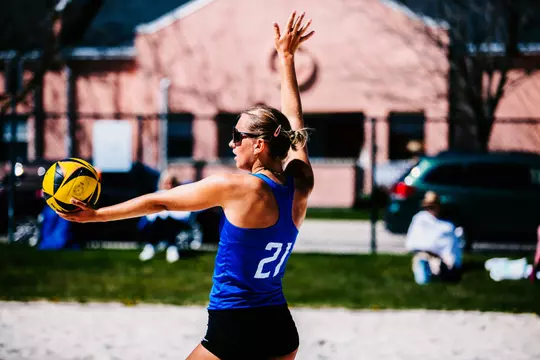
Cultivate Resilience: incorporating a strength-based approach to build healthy coping skills, engage support systems and encourage self-discovery.
Markel Reed was a standout athlete at Temple High School, located in central Texas. He was a member of the track and field team, competing in the long jump and triple jump, but his true love was football, a sport he said Texans consider “generational.” The three-star recruit was a team captain and all-district selection as a junior and senior, earning offers from various Power 5 and in-state schools. Of his numerous options, Boise State stood out above the rest. The day after he graduated high school, Reed flew to the Treasure Valley for summer workouts, saying goodbye to his family and friends. His skill and work ethic were evident from the start and he played in 11 games as a true freshman in 2019.
Unlike most, 2020 was filled with positives for Reed.
“That was a breakout year for me on the field and I was in a good mental state,” he said. “With Covid, it was hard for everybody, but that was a solid year all-around for me to get a bigger role as a true sophomore.”
He eclipsed his statistical totals from the previous season and was primed to carry the momentum into the second half of his collegiate career.
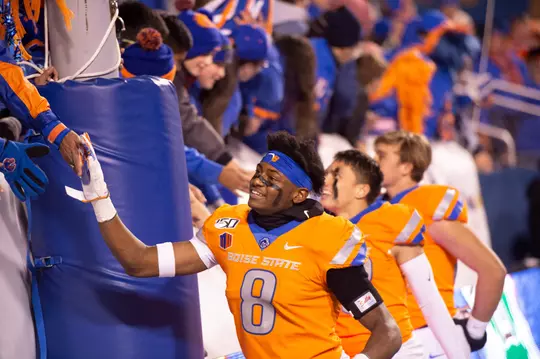
“2020 was a breakout year, but 2021 was also a new breakout year,” he explained. “I’m getting looked at by scouts, agents are looking at me, I had a great start.”
The attention was deserved, as he made 21 tackles in five starts, but disaster struck at practice. A non-contact knee injury ended a once-promising season for Reed, days before the Broncos traveled to Provo for a showdown with No. 10 BYU. Boise State knocked off the Cougars, 26-17, with Reed unable to contribute. As his teammates celebrated the win, he struggled to face his new reality.
“That’s where the mental things started to hit,” he said.
Reed was determined to return but found the journey more difficult than expected.
“The first few stages of surgery and everything, you think you have that handled. As you’re going down the line after surgery, you start walking around and doing rehab day in and day out,” Reed said. “You just get mental reps every day. To not be on the field, that starts to take a toll on you. That’s when I started to reach out, look for resources, look for help.”
The rehab and resources helped Reed recover in time for the 2022 campaign and he started at cornerback against Oregon State in the season opener. After making a tackle on the opening drive, he began to feel like himself again. On the game’s third drive, the unthinkable happened. Reed suffered a season-ending injury on his other leg.
“Coming back from an injury, that’s a big deal. I was excited to be on the field. When the second injury happened on my other knee, that took me to a black hole,” said Reed. After a long pause, he continued. “Everything’s taken away from you again, the same way it happened the previous season. It was like a slap in the face.”
Facing an even tougher climb back into football, Reed turned back to Donaldson, who he first met after his freshman year.
“It all started in 2020 when I had a little work on my shoulder. She was there reaching out and I’d talk to her here and there,” said Reed. “After that first knee injury happened, I built a relationship with Stephanie and it helped me come off that injury. Then the other one happened and I really dove in. I was seeing her two or three times a week and she helped me get through a lot. That whole process of rehab was almost three years.”
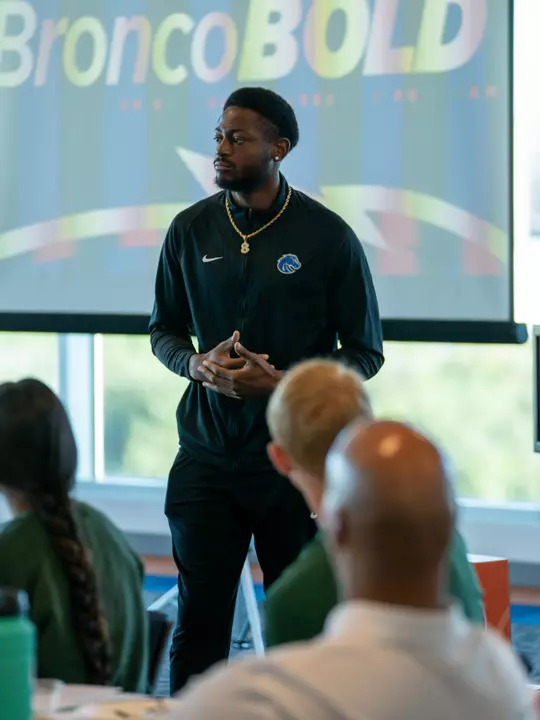
Entering 2023, Reed’s individual goal was to finish the season. He made it through six games before he experienced yet another setback, injuring his right knee. Fortunately, the damage was minor, and Reed saw his opportunity to rehab and return quickly.
“I knew it wasn’t season-ending, it was supposed to knock me out for four games,” said Reed. “I just wanted to be out there. I didn’t want to sit on the sidelines anymore after the previous two seasons.”
The veteran Bronco worked tirelessly to get back on The Blue. With a smile, Reed proclaimed, “I came back in two and a half weeks.”
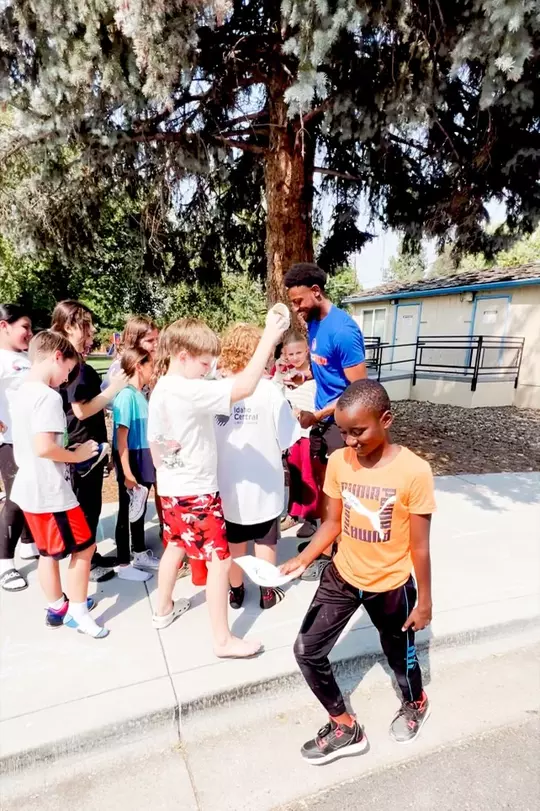
In his absence, other players earned more playing time, but that didn’t keep Reed from contributing to the team’s goal of winning a conference championship.
“I took on that role of teaching and being a leader to those who were playing on the field,” he said.
His leadership was evident, as the Broncos won their final two regular season contests. A team that once faced a 0.1 percent chance at making the Mountain West Championship now had a berth in the game, giving Reed an opportunity to achieve both goals.
The Broncos dominated UNLV, winning 44-20 and earning the program’s 35th conference championship. Reed had a pair of tackles, both on the Rebels’ final drive, which stalled at the Boise State 24-yard line. Minutes later, the MW trophy was hoisted in the air as the Blue and Orange celebrated their improbable title.
“Finishing that season was everything,” said Reed. “Everyone being there with the confetti coming down, it felt like The Brotherhood. We did it all together.”
Two weeks after the championship, Reed obtained his bachelor’s degree from Boise State. Shortly after the 2023 season concluded, Reed decided to return to Boise State for his final season. The sixth year defensive back will lean on his experience to push the Broncos to achieve their goal of winning another conference championship and making the College Football Playoff. To get to this point, he had to live out the BroncoBOLD pillar of cultivating resiliency.
“Resiliency is never giving up, not accepting failure or doubt, and facing fear head-on,” Reed said. “Those are things I did during my injury phases. I looked fear in its face. I looked doubt in its face. Looking at myself in the mirror, I’d say ‘You’re going to get through this. You’re going to come back better.”
To those struggling with setbacks and adversity, Reed has a simple message.
“Keep going. It’s going to be hard. There will be days where you want to give up and not even do it anymore. Just keep going. That’s exactly what I did.”
It wouldn’t have been possible without BroncoBOLD, an organization he admits he wasn’t aware of as a freshman. Now, the entire team is familiar with the initiative and the support it offers.
“If you ask a freshman on the team, they’re going to go ‘I know what BroncoBOLD is. It’s about mental health.’ We have a whole bunch of people embodying it and embracing it, and not just on the football team,” said Reed. “I think every student-athlete here can give you a definition of what BroncoBOLD means and what the goal is. It’s truly amazing.”
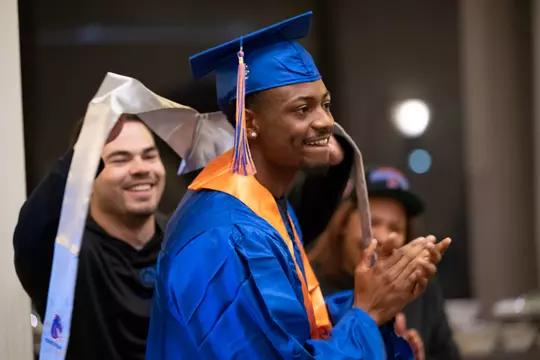
Donaldson, Patock and Reed are just three of the thousands of people furthering the BroncoBOLD initiative. Within the athletic department, annual training is provided to all staff members and monthly “Mental Reps” talks are available to student-athletes. BroncoBOLD partners with interns from multiple majors and collaborates with several colleges at Boise State University. The initiative’s high school ambassador program encourages students to become active leaders in the community through trainings, events and mentorship from Boise State student-athletes.
Together, they are building a culture of resiliency and strength. Together, they are fostering a mentally healthy community. Together, they are BroncoBOLD.
Community Resources Available to the Public
Suicide and Crisis Lifeline: Call 988
Idaho Suicide Prevention Hotline: Text or Call, 1-208-398-HELP (4357)
The National Suicide Prevention Hotline: 1-800-273-8255
Veterans’ Crisis Line: 1-800-273-8255, Press 1
National Domestic Violence Hotline: 1-800-799-SAFE (7233)
SAMHSA’s National Treatment Locator: 1-800-662-HELP (4357)
The NAMI Resource and Referrals Helpline: 1-800-950-6264
Faces Of Hope: 1-208-577-4400
On-Campus Mental Health Resources Available to Boise State Students
Counseling Services/Medical Services: 208-426-1459
Office of the Dean of Students/ CARE Team: 208-426-1527
Violence Awareness and Response/Gender Equities Center: 208-426-4259
Campus Security and Police Information: 208-426-6911
In the case of a life-threatening emergency, call 911 immediately.
